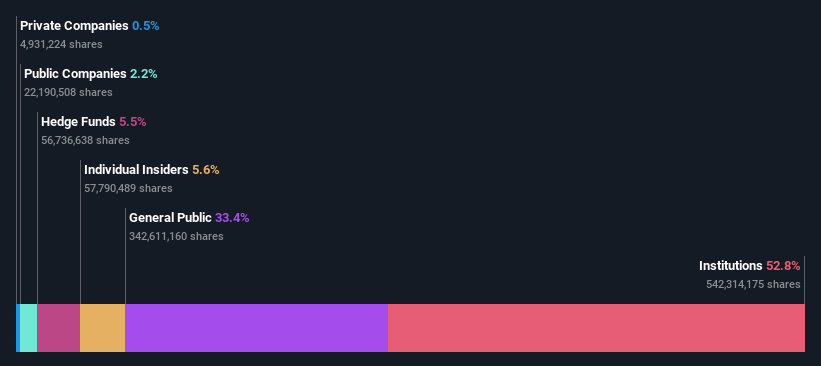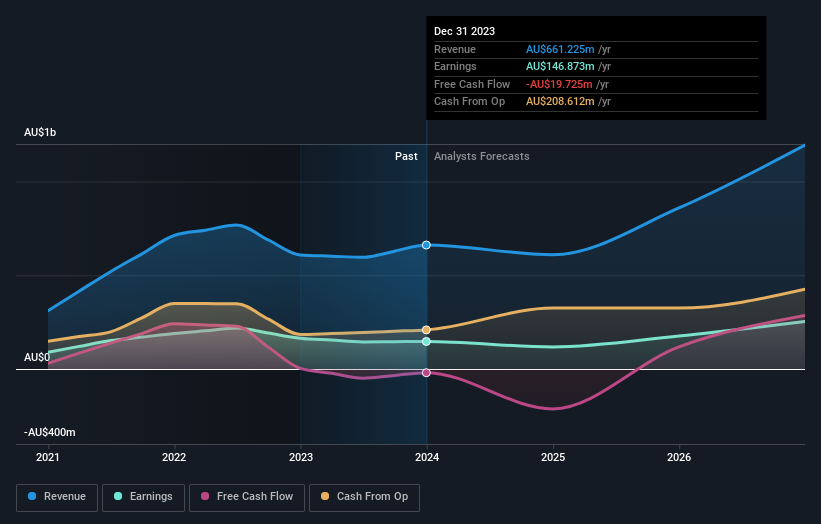Stock Analysis
- Australia
- /
- Metals and Mining
- /
- ASX:WAF
West African Resources Limited's (ASX:WAF) large institutional owners must be happy as stock continues to impress, up 9.5% over the past week

Key Insights
- Significantly high institutional ownership implies West African Resources' stock price is sensitive to their trading actions
- 50% of the business is held by the top 12 shareholders
- Using data from analyst forecasts alongside ownership research, one can better assess the future performance of a company
If you want to know who really controls West African Resources Limited (ASX:WAF), then you'll have to look at the makeup of its share registry. We can see that institutions own the lion's share in the company with 53% ownership. Put another way, the group faces the maximum upside potential (or downside risk).
Last week’s 9.5% gain means that institutional investors were on the positive end of the spectrum even as the company has shown strong longer-term trends. One-year return to shareholders is currently 15% and last week’s gain was the icing on the cake.
Let's take a closer look to see what the different types of shareholders can tell us about West African Resources.
Check out our latest analysis for West African Resources

What Does The Institutional Ownership Tell Us About West African Resources?
Institutional investors commonly compare their own returns to the returns of a commonly followed index. So they generally do consider buying larger companies that are included in the relevant benchmark index.
West African Resources already has institutions on the share registry. Indeed, they own a respectable stake in the company. This implies the analysts working for those institutions have looked at the stock and they like it. But just like anyone else, they could be wrong. When multiple institutions own a stock, there's always a risk that they are in a 'crowded trade'. When such a trade goes wrong, multiple parties may compete to sell stock fast. This risk is higher in a company without a history of growth. You can see West African Resources' historic earnings and revenue below, but keep in mind there's always more to the story.

Investors should note that institutions actually own more than half the company, so they can collectively wield significant power. It looks like hedge funds own 5.5% of West African Resources shares. That's interesting, because hedge funds can be quite active and activist. Many look for medium term catalysts that will drive the share price higher. Our data shows that Van Eck Associates Corporation is the largest shareholder with 10% of shares outstanding. Fidelity International Ltd is the second largest shareholder owning 6.4% of common stock, and Equinox Partners Investment Management LLC holds about 5.5% of the company stock. Additionally, the company's CEO Richard Hyde directly holds 1.7% of the total shares outstanding.
Looking at the shareholder registry, we can see that 50% of the ownership is controlled by the top 12 shareholders, meaning that no single shareholder has a majority interest in the ownership.
While studying institutional ownership for a company can add value to your research, it is also a good practice to research analyst recommendations to get a deeper understand of a stock's expected performance. There are plenty of analysts covering the stock, so it might be worth seeing what they are forecasting, too.
Insider Ownership Of West African Resources
The definition of an insider can differ slightly between different countries, but members of the board of directors always count. The company management answer to the board and the latter should represent the interests of shareholders. Notably, sometimes top-level managers are on the board themselves.
Most consider insider ownership a positive because it can indicate the board is well aligned with other shareholders. However, on some occasions too much power is concentrated within this group.
We can see that insiders own shares in West African Resources Limited. As individuals, the insiders collectively own AU$64m worth of the AU$1.1b company. It is good to see some investment by insiders, but it might be worth checking if those insiders have been buying.
General Public Ownership
The general public, who are usually individual investors, hold a 33% stake in West African Resources. This size of ownership, while considerable, may not be enough to change company policy if the decision is not in sync with other large shareholders.
Next Steps:
I find it very interesting to look at who exactly owns a company. But to truly gain insight, we need to consider other information, too. Case in point: We've spotted 1 warning sign for West African Resources you should be aware of.
But ultimately it is the future, not the past, that will determine how well the owners of this business will do. Therefore we think it advisable to take a look at this free report showing whether analysts are predicting a brighter future.
NB: Figures in this article are calculated using data from the last twelve months, which refer to the 12-month period ending on the last date of the month the financial statement is dated. This may not be consistent with full year annual report figures.
Valuation is complex, but we're helping make it simple.
Find out whether West African Resources is potentially over or undervalued by checking out our comprehensive analysis, which includes fair value estimates, risks and warnings, dividends, insider transactions and financial health.
View the Free AnalysisHave feedback on this article? Concerned about the content? Get in touch with us directly. Alternatively, email editorial-team (at) simplywallst.com.
This article by Simply Wall St is general in nature. We provide commentary based on historical data and analyst forecasts only using an unbiased methodology and our articles are not intended to be financial advice. It does not constitute a recommendation to buy or sell any stock, and does not take account of your objectives, or your financial situation. We aim to bring you long-term focused analysis driven by fundamental data. Note that our analysis may not factor in the latest price-sensitive company announcements or qualitative material. Simply Wall St has no position in any stocks mentioned.
About ASX:WAF
West African Resources
West African Resources Limited engages in the mining, mineral processing, acquisition, exploration, and project development of gold projects in West Africa.
Excellent balance sheet with reasonable growth potential.

